

This course will use these different perspectives as a framework within which to examine some of the main topic areas within psychology.

Mental process is a cognitive psychology process or we can say analytical process that is not observable directly. For example, there is a process that you follow in order to tie your shoes.
Mental processes series#
Together these approaches explore a multitude of issues such as relationships, persuasion, psychobiological processes, sensation and perception, consciousness, learning, memory, thinking and language, intelligence, motivation, emotion, development, personality, psychological disorders, therapy, psychology and health, social cognition and social influence. Mental process is defined as the mechanism that receives information from environment analyzes them and makes decision or develop attitude based on the analysis. What is mental process Processes: In general, a process is a series of steps or actions that lead to an end result. More generally a number of different perspectives have developed that place their emphasis on specific sets of concerns and we now recognise perspectives such as social psychology, cognitive psychology, abnormal psychology and developmental psychology to name just a few. But the three kinds of mental processes have to do with (1) information processing, (2) symbol manipulation. During the 1930s, for example, mainstream psychology excluded the ‘the mind’ from consideration and focused only on behaviour. The distinctions, predictably, are not always clear. In its relatively short history as an academic discipline psychology has, however, changed direction, focus and approach several times. Some take place under controlled laboratory conditions, others are carried out 'in the field' in everyday settings. Mental process or mental function are terms often used interchangeably for all the things that individuals can do with their minds. Theoretical Assumptions Mediational processes occur between stimulus and response: The behaviorists approach only studies external observable (stimulus and response) behavior that can be objectively measured. Psychological experiments can be carried out in a variety of settings. Cognitive functions, including memory, attention, language, decision making, and problem-solving, are mental processes that help people gather and process information. Mediational processes (e.g., thinking, memory) occur between stimulus and response. In other words, psychologists carry out experiments, formulate hypotheses and test theories. First, psychology is a science, and uses the same scientific method as other scientific disciplines such as chemistry, physics and biology. This simple definition incorporates a number of features. Modern day psychology can perhaps be defined as the scientific study of behaviour and mental processes.


 0 kommentar(er)
0 kommentar(er)
